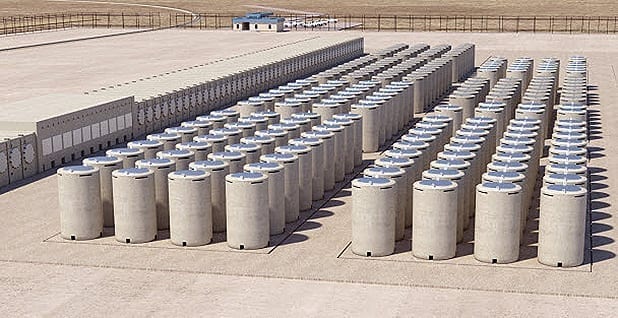
A recent Supreme Court ruling nullifies the Nuclear Regulatory Commission’s authority to issue a license for a proposed interim storage facility for spent nuclear fuel in Texas, the state argued in court this week.
The high court’s June 30 ruling in West Virginia v. EPA “demonstrates that the Nuclear Regulatory Commission lacks statutory authority” to license Interim Storage Partners’ (ISP) proposed site in Andrews County Texas, state solicitor general Michael Abrams told the Fifth Circuit Court of Appeals in a letter dated Wednesday.
The brief puts nuclear waste in the first wave of legal arguments filed in the wake of the landmark Supreme Court decision, which advocates of environmental conservation fear will limit the rulemaking power not only of the Environmental Protection Agency, but of federal agencies broadly. The Supreme Court is an independent branch of the federal government.
Texas’s invocation of West Virginia v. EPA gives the state new ammunition, in the form of the so-called major questions doctrine, about two months before the state’s lawsuit against NRC was scheduled for oral arguments.
Until now, in the roughly ten-month battle with NRC over the proposed ISP site, Texas Attorney General Ken Paxton had argued that the agency’s September decision to license the site violated the Nuclear Waste Policy Act and the National Environmental Policy Act.
NRC pushed back against that argument, saying that while the federal government cannot legally operate an interim storage facility, private companies can — and the NRC is allowed by the Atomic Energy Act (AEA) to license a privately owned facility.
The recent Supreme Court ruling upholds a legal theory known as “major questions doctrine,” Abrams said in Wednesday’s filing. That doctrine holds that Congress must authorize federal agencies’ decisions on issues of major political or economic significance.
In West Virginia, Abrams argued, the Supreme Court said the major questions doctrine applies when a federal agency assumes powers that Congress has repeatedly refused to grant. In those situations, “an agency cannot regulate without ‘clear congressional authorization,’” he said in Wednesday’s filing.
NRC’s “expansive” power to license the proposed ISP site falls into the major questions category because the commission “relies on the Atomic Energy Act of 1954 [AEA] to license the storage of all of the Nation’s commercial spent nuclear fuel at the Texas-New Mexico border without state consent,” Abrams said.
Abrams also referred to a 2004 case in the D.C. Circuit Court of Appeals, which NRC has used to justify its authority to license interim storage. In that case, the court acknowledged that the agency’s authority as laid out in AEA “does not specifically refer to” spent fuel storage or disposal.
“Under the major questions doctrine, that is the end of the matter,” Abrams said.
The ISP site, if it gets built, would be able to store around 40,000 tons of spent fuel — or about half of the country’s total spent fuel inventory of close to 90,000 tons. NRC licensed the site to operate for 40 years.
NRC told RadWaste Monitor via email Thursday that the agency does not comment on pending litigation. “Our formal response will go to the court in due course,” an agency spokesperson said.